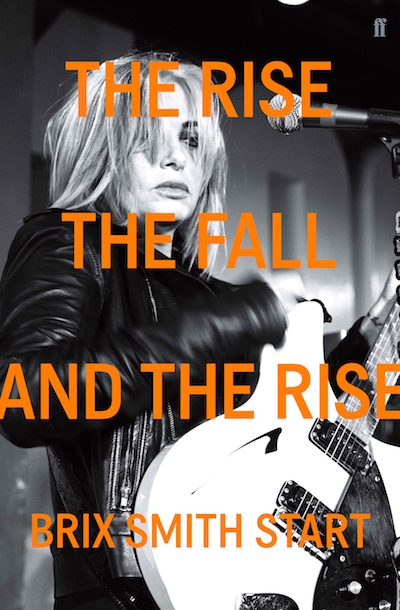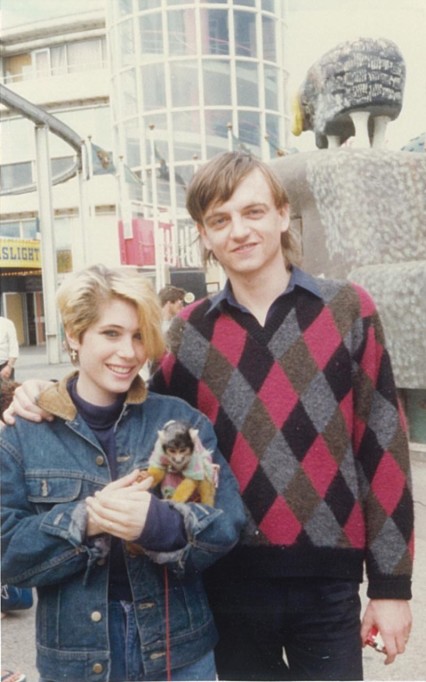In advance of the publication of The Rise The Fall and The Rise, one of this year’s most anticipated and inspirational rock memoirs, Craig Austin speaks with Brix Smith-Start, former guitarist and songwriter with The Fall. Via the likes of ‘Cruiser’s Creek’ and ‘L.A.’ the author played a key role in the most influential and unwavering post-punk band of them all. Brix spent a decade in the The Fall before a violent disintegration that led to her exit and the end of her marriage to frontman Mark E. Smith. Yet Brix’s story is so much more than an assemblage of rock’n’roll highs and lows, portraying as it does the remarkable journey of a teenage Californian girl on a collision course with uncompromising English radicalism, and ultimately mid-life success in both TV and fashion.
‘This book was a long time coming’, Brix tells me as we sip coffee in one of the typically genteel cafes that populate the once shadowy side streets of London’s congested City Road. ‘I really needed to heal from the whole experience and become objective. I needed to write it from a place of complete honesty and without an axe to grind. It’s really important to me that it’s not a bitter book. There’s a dedication within it to the people with whom I’ve had the most difficult relationships because it was those experiences that helped make me the person that I am. I learned from every one of them and they’re all important to the story’.
Almost twenty years on from the end of her ill-fated second stint with The Fall, Smith-Start, aka Laura Salenger, aka ‘Brixton’, retains the unmistakable visual energy and pop sparkle that characterised her Mancunian tours of duty. While her heart undoubtedly remains an anglophile one, it’s evident that her singular sense of style and snow-white Californian teeth have weathered Lancashire’s bleakest excesses with admirable aplomb. We discuss how in recent years a mini-industry appears to have inadvertently sprung up around Fall-related journals, yet what’s immediately refreshing about Brix’s book is the degree to which The Fall, and to a lesser degree the underrated output of her parallel solo project The Adult Net, represents only a component of the bigger story; one which takes in recurrent themes of displacement, personal loss and – until relatively recently – a nagging absence of personal control: ‘A lot of journalists are focusing on The Fall because a number of women are now retelling the history of rock through women’s eyes. Women and men experience things differently, we’re wired differently. The music industry was hard for us then, it was a very male-dominated environment, and it’s only now that those stories are being told’
 Given this context there are evident similarities between Brix’s book and the equally inspiring memoirs of Viv Albertine – not least the seemingly ever-present menace of sexual violence that permeated the prevailing culture of the 1970s. Yet Brix’s personal dynamic within The Fall, given her marriage to the band’s less than benevolent dictator and her analogous role as one if its primary songwriters, remains a uniquely compelling one. Her recollections of the unravelling of both relationships – the point at which ‘he was beginning to become unglued’ – are especially enlightening given the creeping critical perception of Smith as an artist increasingly drawing from a diminishing well of patience and goodwill: ‘As an artist and someone who I think understands the workings of his mind more than others, I understand what he’s doing, and has done, because by creating chaos he’s changing the energy. He makes the ground slippery for everybody and therefore they all have to try harder to keep it together. In a way, it’s how he creates the art. Yes, it’s unpleasant to watch. Yes, it’s unpleasant to be a part of, but sometimes brilliance comes out of that. Sometimes it’s just destructive. You just don’t know, but I give him credit for seeking to change the energy in the only way he knows. It’s why the band had never really stagnated. I understand where it’s coming from and it was my choice to be a part of it or not. It can be like watching a car crash but it’s never anything less than fascinating’
Given this context there are evident similarities between Brix’s book and the equally inspiring memoirs of Viv Albertine – not least the seemingly ever-present menace of sexual violence that permeated the prevailing culture of the 1970s. Yet Brix’s personal dynamic within The Fall, given her marriage to the band’s less than benevolent dictator and her analogous role as one if its primary songwriters, remains a uniquely compelling one. Her recollections of the unravelling of both relationships – the point at which ‘he was beginning to become unglued’ – are especially enlightening given the creeping critical perception of Smith as an artist increasingly drawing from a diminishing well of patience and goodwill: ‘As an artist and someone who I think understands the workings of his mind more than others, I understand what he’s doing, and has done, because by creating chaos he’s changing the energy. He makes the ground slippery for everybody and therefore they all have to try harder to keep it together. In a way, it’s how he creates the art. Yes, it’s unpleasant to watch. Yes, it’s unpleasant to be a part of, but sometimes brilliance comes out of that. Sometimes it’s just destructive. You just don’t know, but I give him credit for seeking to change the energy in the only way he knows. It’s why the band had never really stagnated. I understand where it’s coming from and it was my choice to be a part of it or not. It can be like watching a car crash but it’s never anything less than fascinating’
I put it to Brix that Smith’s fairly recent reference to her as – ‘the name that must not be uttered’ – suggests that, for good or for her ill, she still retains an undeniable presence within his life. ‘Well…’, she pauses for a moment, ‘I have no idea what he thinks about me, nor can I control what he thinks about any of it. I can just tell you how I feel about him. We shared something that was a really intense, almost soulmate connection, and I feel that we were meant to be together, that we were meant to write together. For the time that it lasted it was fine but once you have that kind of connection with someone you always have that connection to them. I’m at that point where I’m happy he’s still creating. I’m happy he’s carrying on. I saw their thing at Glastonbury last year and it was great. The band is really tight and he gets it together and he goes up and down. If he has an issue with me, it’s his issue. It’s nothing that I’ve done. I’ve only ever sought to speak the truth and to speak kindly about him because I have no animosity towards the guy. Obviously, our relationship affected him deeply in some way and I would hope that he can make peace with that but it’s still clearly painful for him to talk about me’. And at this, Brix lifts up the sleeve of her dress to reveal a tattoo bearing the words of a mantra that reoccurs throughout the pages of her book – ‘this too shall pass’. ‘My grandmother used to say this to me all the time. Throughout my childhood and then when she died. I’d hear her saying it to me at points in my life. So I thought “fuck it – I’m getting it on my arm!” – it’s a granny-tatt!’
Yet regardless of her own personal experiences within The Fall, there remain few fans that could seemingly rival Brix’s adoration of the band’s artistic output. ’One of my intended goals when I joined The Fall was not to seek to change the band. I was always of the view that people should know how totally amazing this band is. It’s totally unique. It’s totally influential. People should know about this band in every corner of the planet. They should be revered. It was frustrating for me that they were only seen as a cult band at the time and that it had never really broken out of that. My goal was to get them to break out of that without fundamentally changing what The Fall was about. I just wanted to add a little light to their shadow, or bring out a hook that was there. The hypnotic amazing rhythms, the cacophonous noise that seemed to create a visual soundscape, it was just mentally brilliant. And the words, or course’ Brix gushes. ‘Listening to The Fall is like listening to an aural Rorschach test. You can’t really decipher what Mark’s saying but whatever he’s saying doesn’t matter because you hear what you need to hear. You take away from the song what you individually need. It’s quite magical in that sense. But once I first saw the words written down on paper they were more brilliant than you could even imagine. And then he’d change them’, she laughs. ‘They’d keep on morphing’.
On a less creative note, I’m personally thrilled by Brix’s willingness to corroborate a number of Fall anecdotes that I had previously suspected to be apocryphal; in particular, the received wisdom that Mark E. Smith once bulleted a soundman for eating a salad. ‘Yes, that was true’ she grins. ‘He just did it. There were probably others issues leading up to the sacking of Rex Sargent but for some reason the salad seemed to be the thing that tipped him over the edge’.
Does Brix think that M.E.S. will read the book? ‘I have no idea whether he’ll read it or not. If he does, I would hope that the love would come through to him. I think that in all ofthe interviews I’ve given I’ve been super honest and complimentary, never getting down on him or ripping him apart. I think he would respect that and the fact that I’m speaking from a good place and with honesty’.

It’s certainly true that as rock memoirs go, especially given the often painful events that it often depicts, The Rise The Fall and The Rise is one resolutely grounded in the Californian foundations of optimism and hope. It could only have been written by a woman who is at last at peace not just with herself but also with her place in the world. In parts it’s a love letter to Brix’s West Coast childhood, to the redemptive magical powers of Disneyland, and ultimately the liberating victory of self over circumstance. It’s a book punctuated by occasional passages of almost dream-like quality, a series of seemingly prophetic (and occasionally foreboding) allegories rooted in the author’s earliest years. ‘They’re all foretellings of incidents and events that would happen in my life’ she tells me. ‘Those sections are the closest you’ll ever get to knowing me. They work on different levels. The section that’s based on the Peter Pan ride at Disneyland is especially telling. That ride is almost cartoon-esque but it’s real at the same time. You look down and you see the diorama of the city, these twinkling lights, the Thames, and I remember looking down as a child and thinking “I love London! I love that place!”. It was like this fairy-tale place to me. Ever since I was a child I always somehow knew that that’s where I’d end up, in England’. So given an anglophile experience that began in Prestwich and concluded in Shoreditch, I wonder how the component parts of Brix’s psyche are currently constituted having spent such a significant part of her life away from her native California. ‘Well I feel English in my heart’ she explains, ‘but obviously there’s California in me, there’s Chicago in me, the salt-of-the-earth Midwestern thing, but I feel more English than American now, for sure. I feel much more of a kinship to the UK than I do America. When Peter Pan, yelled out “Set a course for England!” on that Disneyland ride I can’t tell you how much I’ve always identified with that’.
There’s a pivotal moment in Brix’s book, an initially crushing one, that acts as the starting gun for the second ‘rise’ of its title; one that takes place after her ill-fated second stint in The Fall – ‘In life’, Brix declares, ‘you should never, ever go back’. It’s the late 90s, at a point where she has returned to California and is waitressing at a L.A. restaurant while living in a garage that she has rented from the parents of The Bangles’ Susanna Hoffs. One evening she is ‘outed’ by a member of fellow Mancunian band James with the words ‘didn’t you used to be Brix Smith?’. ‘I had dreamt of, and created this amazing life’ she recalls. ‘I’d wanted to be a musician, I’d wanted to be in a great band and then it all decayed and crumbled and got completely fucked up. I felt like I’d lost everything that I’d set out to achieve. That I was back to square one, doing something where I wasn’t being creative, doing something that I needed to do just to get by. I tried to see the beauty in serving fish’ she laughs, ‘and being abused by patrons, but it was actually extremely humbling and grounding to do all of that because that’s when you see what you’re made of. That’s when you’re levelled. I did have a big ego but that came from a place of insecurity. So when all that goes away, when you’re stripped of it all, it’s just about humanity. It’s when I knew that I had to rebuild myself as a person, I couldn’t rely on these false superficial things anymore – when I went back to L.A. that was the actual start of the rise’.
Partway through our conversation, at a point when neither of us is yet aware that the untimely death of Prince Rogers Nelson has already occurred, we both pause as one as the opening chords of Life On Mars tumble out of a tinny café radio. There follows a moment of unintended silence, as the author reflects upon her lifelong adoration of all things Bowie, the teenage Laura Salenger momentarily exchanging places with the woman who ultimately succeeded her. Wiping away a (actual) tear, Brix enters into a prolonged exaltation of the man and his work that culminates in her yelling the word ‘genius!’ and the heartfelt assertion (about the elegant departure of Blackstar) that ‘that’s the way to do it!’
Brix’s lifelong love affair with music, with Bowie, with the music of The Fall, evidently remains at the core of her remarkable memoir. It’s therefore wholly emblematic of the redemptive manner of her story’s arc that she continues to pursue her first love alongside her burgeoning career in TV and fashion. Now, as the vocalist of Brix and The Extricated, a band primarily comprised of former members of The Fall, she has rediscovered the thrill of live performance, of connecting with an audience, and of embracing the friendship of former comrades with whom she once served on the frontline of art-rock conflict. When I mention that a number of friends had recently been to see the band live she is eager to hear what they made of it, whether it met their expectations. ‘The band is an amazing band. We love playing together. It feels great. It’s quite healing actually. We go out there and we mean business. We live for those shows’. Brix also reveals that she is currently working on an album of her own, with the evident zeal of an artist reborn: ‘once I started writing the book the floodgates opened and their must have been a bladder of songs waiting in the ether that had built up over fifteen years’
As we part with a hug, I can’t help but compliment the author on her infectious unyielding positivity. It’s the same positivity that permeates the pages of her book like Californian sunshine. ‘I always to try to be grateful for the things that I have’ she explains. ‘For all of the good things in my life. Not money or material things, but simple things like water. Like toothpaste. Like teeth!’ she laughs. ‘For my husband. For my dogs’.
‘In the end’, she reflects, ‘love is always the answer’.
The Rise, The Fall and The Rise is published by Faber on May 5th
Smith-Start art by Dean Lewis
Photo credit – Brix Smith-Start












